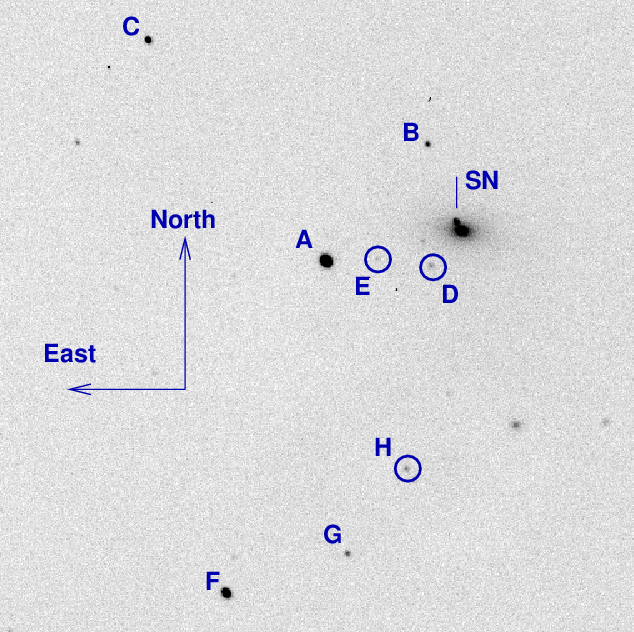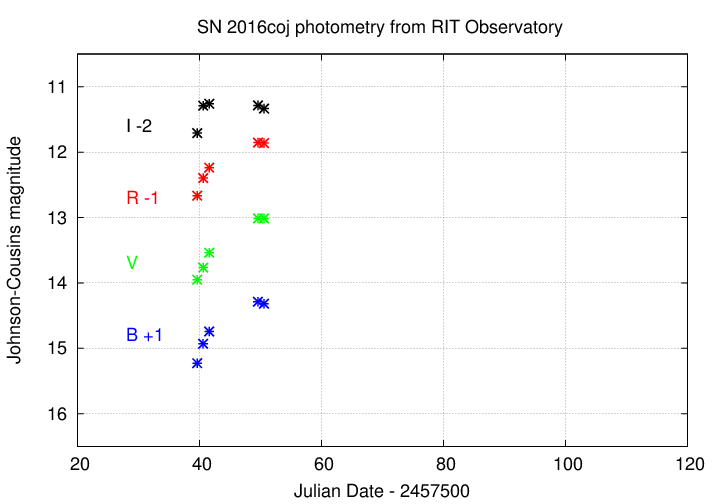
On the night of Jun 10/11, 2016, Kaitlin Schmidt and I acquired a set of observations of SN 2016coj in NGC 4125, as well as a short run of measurements of the eclipsing binary star HH UMa.
The main setup was:
Notes from the night:
SN 2016coj is a Type Ia supernova in the relatively nearby galaxy NGC4125. It was discovered by the KAIT group some time before maximum light:
NGC 4125 RA = 12:08:05.7 Dec = +65:10:30 (J2000)

There are, alas, no really good sources of photometry for the stars marked above. I have created an interim set of magnitudes using the UCAC4 and converting the SDSS r and i magnitudes into Johnson-Cousins R and I via the conversion formulae of Jester et al. (2005). I hope to replace these interim values with better ones at some point.
letter B sigB V sigV R sigR I sigI ------------------------------------------------------------------------- A 10.981 0.004 9.888 0.006 9.247 0.032 8.651 0.036 B 15.202 0.004 14.130 0.005 13.621 0.032 13.146 0.035 C 13.320 0.004 12.671 0.006 12.302 0.032 11.955 0.036 D 15.939 0.003 15.038 0.007 14.370 0.031 13.749 0.034 F 13.066 0.004 11.663 0.006 10.947 0.032 10.282 0.035 G 15.047 0.006 14.365 0.006 13.977 0.032 13.613 0.035 -------------------------------------------------------------------------
I took 10 images per filter of the SN and its host galaxy. I was able to guide in VRI, but not B-band.
I used the rotsub technique to remove the galaxy's light, as best I could. It's not perfect.
Using aperture photometry with a radius of 4 pixels (radius of 5.5 arcsec), I measured the instrumental magnitudes of a number of reference stars and the target. Following the procedures outlined by Kent Honeycutt's article on inhomogeneous ensemble photometry, I used all stars available in each image to define a reference frame, and measured each star against this frame. I used the interim reference magnitudes above plus color terms which I am currently revising -- so please treat these results as preliminary to convert the ensemble instrumental magnitudes to the standard Johnson-Cousins BVRI scale.
Results from this evening are:
filter mag mag_uncert Julian Date SN B = 13.224 +/- 0.103 (ens 0.041 zp 0.094) 2457550.58146 SN V = 13.048 +/- 0.036 (ens 0.023 zp 0.028) 2457550.58720 SN R = 13.040 +/- 0.064 (ens 0.027 zp 0.058) 2457550.59241 SN I = 13.476 +/- 0.096 (ens 0.058 zp 0.077) 2457550.59830
A preliminary light curve of the SN is shown below. It appears to have started declining from the peak -- which we missed at RIT due to a stretch of bad weather.

Last modified 6/21/2016 by MWR.